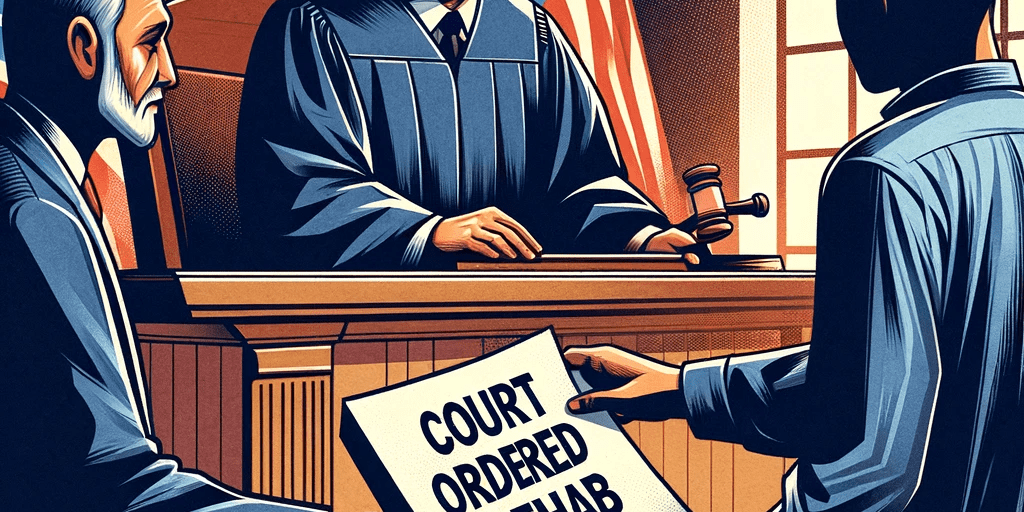What happens when rehab isn’t a choice but a mandate? In this guide, we explore the ins and outs of court-ordered drug rehab, clarifying eligibility requirements, describing program options, and examining the repercussions of non-compliance. Consider this your roadmap to understanding an enforced path to recovery.
Key Takeaways
- Court-ordered drug rehab in the UK is a legally binding mandatory rehabilitation program for drug-related offenders aimed at addressing substance abuse to reduce both drug use and criminal behaviour; it involves a coordinated approach by judges, healthcare providers, and case managers, supervised by probation officers.
- Eligibility for court-ordered rehab is case-specific, often favouring non-violent, first-time offenders with substance abuse issues; rehabilitation includes detox, residential, and outpatient treatments tailored to individual needs within a criminal justice framework.
- The success of court-ordered rehab depends on factors like individual motivation, program quality, and post-treatment support; financing is the individual’s responsibility, though insurance and alternative payment options are available, and failing to complete rehab can lead to legal repercussions.
Understanding Court-Ordered Rehab

Court-ordered rehab, also known as a court order-mandated rehab, is a mandatory government-enforced rehabilitation program required by the UK’s criminal justice system for individuals convicted of drug-related crimes. The aim is to address substance abuse and reduce criminal activity within the community by taking a therapeutic approach to substance use disorders instead of punitive measures.
The primary goal of court-ordered drug rehab is twofold: helping individuals overcome their dependence on substances and curbing illegal behaviour by tackling its root causes. Studies show that comprehensive treatment designed explicitly for offenders can significantly decrease both addiction relapse and recidivism rates when ordered by the court.
The Legal Process for Court-Ordered Rehab
The journey towards recovery begins when someone is charged with a drug-related offence, and the court orders them to enrol in a rehab programme. The process involves judges, case managers, attorneys, healthcare providers, and therapists working together to coordinate treatment for the offender. They are supervised by a probation officer who ensures their compliance with the rehab program.
Offenders assigned to court-ordered rehab treatment facilities in California undergo a treatment placement evaluation to seek treatment. This evaluation is conducted through either multidisciplinary or court-ordered methods. The Court Support Services Department (CSSD) monitors participants and ensures that all rehabilitation program requirements are effectively met. CSSD may collaborate with well-known organizations like American Addiction Centers throughout this process.
Eligibility Criteria for Court-Ordered Rehab
Eligibility for court-ordered rehab is evaluated on an individual basis. Those most likely to qualify are non-violent drug offenders, first-time offenders, and individuals with a previous history of substance abuse, though there are several programs tailored for more high-risk offenders too
In accordance with Section 212 of the UK’s Criminal Justice Act 2003, this type of rehabilitation applies to criminal offenders, specifically to certain offenses committed by those over the age of 18 after April 4th, 2005. The treatment usually commences within two weeks for those under an Alcohol Treatment Requirement and falls under the jurisdiction of a drug court.
Types of Court-Ordered Rehab Programs

Court-ordered rehab programs specifically address addiction and its accompanying issues by incorporating a range of interventions. These may include detoxification, both inpatient and outpatient treatment options, as well as various therapeutic techniques. The overall goal is to provide comprehensive support for individuals struggling with substance abuse within the framework of the criminal justice system.
The treatments offered under court-ordered rehab encompass alternatives like accelerated pre-trial rehabilitation, educational courses on either drug abuse or alcohol misuse, group counselling sessions, residential facilities for recovery purposes, and hospitalization services aimed at treating withdrawal symptoms effectively via safe detox procedures.
By targeting drug and alcohol addiction head-on through these rehabilitative measures prescribed by the drug courts themselves. This initiative aims not only to help deter any involvement in illicit activities related to drugs but also to equip individuals with crucial tools necessary post-treatment when dealing with triggers that could result in relapse. Whether it’s addressing instances of drug or alcohol dependency separately or opting instead for an all-inclusive approach towards tackling them simultaneously through enrollment into appropriate rehab programs, these efforts serve mainly one purpose: promoting long-term sobriety.
Detoxification
In court-ordered rehab programmes, individuals often take the first step of detoxification, wherein they must rid their bodies of harmful substances like drugs and alcohol. This can lead to uncomfortable withdrawal symptoms such as anxiety, depression, irritability, insomnia, nausea, vomiting, sweating, tremors, and shaking. To treat these difficult symptoms, different medical interventions and medications may be used during detox and recovery. These include clonidine for long-lasting withdrawal effects, buprenorphine for opioid abuse, and benzodiazepines for alcohol withdrawal. Moreover, mirtazapine is prescribed for a variety of substance addictions, including those related to drug or alcohol abuse.
Inpatient and Outpatient Treatment

Court-ordered rehab offers the choice between inpatient and outpatient treatment, both providing different levels of care. In an inpatient setting, individuals stay at the facility 24/7 for intensive support while receiving various therapies. On the other hand, with outpatient treatment, they have more flexibility as they can live at home but still attend scheduled therapy sessions.
The decision between these two options depends on factors such as addiction severity and the specific needs of those seeking help. With its comprehensive approach to tackling addiction-related issues, inpatient facilities offer a range of services tailored to each individual’s needs.
Duration and Effectiveness of Court-Ordered Rehab
The length of court-ordered rehab is not standardized and can vary depending on factors such as the severity of addiction, progress in treatment, and specific court orders. Those with more severe addictions may need longer programs lasting 180 days or even longer.
On the other hand, individuals who show significant improvement in their recovery journey and meet set treatment goals may have a shorter duration for their ordered rehabilitation program. If an individual’s progress is deemed insufficient by the court, they reserve the right to extend the time spent in a court-ordered rehab program to allow for necessary treatment.
Factors Influencing Treatment Length
The length of court-ordered rehab programs can vary from a minimum of 6 months to potentially over a year, in accordance with legal guidelines. The duration is determined by the severity of an individual’s addiction and their advancement during treatment.
Modifications may be made to the original time frame based on the person’s specific needs and progress while undergoing rehabilitation through court orders, allowing for potential extensions or reductions as necessary.
Success Rates and Long-Term Outcomes
The effectiveness and long-term results of court-ordered rehab rely on various factors, such as the individual’s drive, the quality of the program, and post-rehab support. Studies suggest that for most people struggling with a substance use disorder or disorders, court-ordered rehab can be equally or more effective than voluntary rehabilitation. In fact, those who complete court-ordered treatment often report lower rates of drug usage compared to individuals without access to treatment.
Research shows that completing a recommended length of stay in a treatment program is one of the strongest predictors for positive outcomes. A longer duration spent in recovery has been linked to better results overall.
Financing Court-Ordered Rehab
Individuals are primarily responsible for covering the costs of court-ordered rehab. This can be done through insurance or other payment methods. The total amount paid for court ordered differs as such expenses may vary depending on factors such as the type and duration of treatment, level of care needed, facility status (for-profit vs non-profit), and location.
Some facilities offer quality treatment at a reduced cost to make rehab more accessible for those with financial constraints. Treatment options should still be carefully considered when determining the most suitable option within one’s budget.
Insurance Coverage for Court-Ordered Rehab
The extent of insurance coverage for court-ordered rehab is determined by the specific policy. A significant number of UK health insurance plans include provisions for substance abuse treatment, which may cover court-ordered rehab as well. Among these insurers are BUPA, CIGNA, AXA, Aviva, WPA, Blue Cross Shield and Aetna. It should be noted that not all policies encompass this type of treatment and details vary depending on each plan’s terms.
In the United Kingdom, individuals with a need to attend rehabilitation services mandated by a legal order may have their expenses covered through certain private healthcare providers. These companies such as BUPA, CIG, NAC, AXA, Aviva, WPABlue, and CrossShield many other similar firms typically offer support towards costs related to drug or other drug and alcohol rehab and addiction therapy. Patients must keep in mind that there could exist disparities between distinct schemes regarding whether they finance mandatory recovery programs.
Alternative Payment Options
In situations where insurance does not cover the full cost of court-ordered rehab, there are other payment options available for individuals to explore. These alternatives include sliding scale fees that consider an individual’s income level, government-funded programs, and private loans.
Some rehabilitation facilities offer support in the process of obtaining a loan by either connecting individuals with direct lenders or aiding directly through the centre itself.
Consequences of Failing to Complete Court-Ordered Rehab
Not completing court-ordered rehab can lead to serious consequences like fines and imprisonment. Individuals may be required to undergo longer treatment or after jail time have their probation/parole revoked.
It is important for those under a court-ordered rehab mandate to take it seriously and comply with all requirements. Seeking treatment promptly will not only prevent negative consequences, but also help in the rehabilitation process.
Finding a Court-Ordered Rehab Facility

Selecting the right court-ordered rehab centre is crucial for a successful recovery. For those with this type of legal requirement, they have the freedom to choose which facility suits them best. Considerations when making this decision include receiving recommendations from various sources such as health departments, drug and alcohol abuse organizations, social services agencies or individuals in recovery themselves. Other factors may also come into play like accessibility limitations and availability of outpatient treatment programs.
It’s important to note that opting for an accredited rehabilitation centre has its benefits, one being the assurance of quality care provided by facilities displaying logos like American Addiction Centres. These establishments must meet strict standards set for addiction treatment after undergoing thorough evaluations. To search for certified centres online, use platforms such as All Treatment’s website. To achieve success in rehabilitation, however. It takes more than just selecting a suitable treatment facility, – customized plans tailored towards each individual are essential in increasing the chances of long-term recovery.
Accredited Treatment Providers
Facilities that are accredited offer proven treatment methods and therapies to ensure the best quality care for individuals seeking addiction treatment. Leading organizations such as CARF (Commission on Accreditation of Rehabilitation Facilities) and Elements Behavioural Health provide accreditation to drug and alcohol rehab and providers, with a rigorous evaluation process in place to meet high standards.
To confirm the accreditation status of a facility, one can refer to federal and state licensure requirements or consult independent accrediting bodies specialized in health and human services like SAMHSA or CARF International. These facilities undergo strict evaluations by these reputable entities as part of their commitment to providing effective addiction treatment options.
Customizing Treatment Plans
Creating a personalized treatment plan is crucial for achieving successful recovery. This requires collaboration between the rehab facility and court team to develop an individualized approach that addresses the unique needs of each person. An assessment will be conducted to gather specific information about their challenges, goals, and overall situation in order to create a tailored treatment plan.
The plan may need modifications as they progress through treatment based on their response to interventions and any new obstacles they encounter during their journey toward recovery.
The plan may need modifications as they progress through treatment based on their response to interventions and any new obstacles they encounter during their journey toward recovery.
Summary
Navigating the path of court-ordered drug rehab can be a challenging journey. Yet, with the right understanding and support, it can be a transformative experience. From understanding what court-ordered rehab is, its legal processes, and eligibility criteria, to exploring different types of programs, understanding treatment duration and effectiveness, and examining financing options – each aspect plays a crucial role. The consequences of failing to complete court-ordered rehab emphasize the importance of commitment to the recovery process. Ultimately, finding an accredited rehab facility and customizing treatment plans to individual needs are key to successful recovery.
Frequently Asked Questions
What is a DDR order?
A Drug Diversion and Rehabilitation (DDR) order is a court-mandated drug treatment program which provides a speedy avenue for offenders to access necessary assistance in addressing their drug addiction and reducing criminal behaviour associated with drugs. This service is specifically geared towards aiding individuals who have committed various drug-related offenses and may be struggling with substance use disorders.
A drug treatment program offered through the DDR order provides a speedy avenue for offenders to access necessary assistance in addressing their drug addiction and reducing criminal behavior associated with drugs. This service is specifically geared towards aiding individuals who have committed.
What is a skill used in avoiding substance abuse?
Resisting social pressures, enhancing self-confidence, developing better decision-making and communication abilities, and acquiring stress and anxiety management techniques are important skills that can prevent substance abuse. By utilizing these skills in difficult situations, you can make more positive choices for yourself.
These strategies empower individuals to avoid falling into the trap of drug or alcohol use by building their resilience against peer pressure, boosting their sense of worthiness, and honing critical thinking skills when faced with tempting offers from others around them
What is the goal of court-ordered drug rehab?
The objective of court-ordered alcohol or drug abuse rehabilitation is to aid individuals battling with addiction in improving their overall well-being and decreasing involvement in criminal behavior within the community. The goal is to offer necessary treatment and assistance for those who require it, specifically targeted towards addressing substance abuse.
Who is eligible for court-ordered rehab?
Individuals who have been convicted of non-violent drug offenses, are first-time offenders, or struggle with a history of substance abuse may qualify for court-ordered rehabilitation. This alternative sentencing approach aims to promote recovery rather than impose punishment on those facing addiction.
Court-mandated rehab can offer individuals the chance to receive treatment and support instead of traditional forms of legal consequences. If you fall under one or more categories mentioned above, there is a catch.
What are the different types of court-ordered rehab programs?
Rehabilitation programs mandated by a court of law involve various methods such as the process of cleansing one’s body from addictive substances, both in specialized facilities and at home. There are options for intensive residential treatment or non-residential therapy sessions to help individuals address their addiction.
Author
-
Dr Otulana is PCP’s longest-serving doctor. He is an experienced Physician with Specialist Interest in Substance Misuse Management and he has a wide range of experience in the assessment and management (including detoxification) of clients with various drug and substance addiction problems. Dr Otulana started practising as a doctor in 2000 and with over 10 years as an Addiction Physician. He is an Advanced Addiction Practitioner Member of Addiction Professionals and also holds the Certificate in Clinical Psychopharmacology (Part 1) of the British Association for Psychopharmacology. He is additionally a strong healthcare services professional with a Master of Business Administration (M.B.A.) degree from Cambridge University Judge Business School.
View all posts








